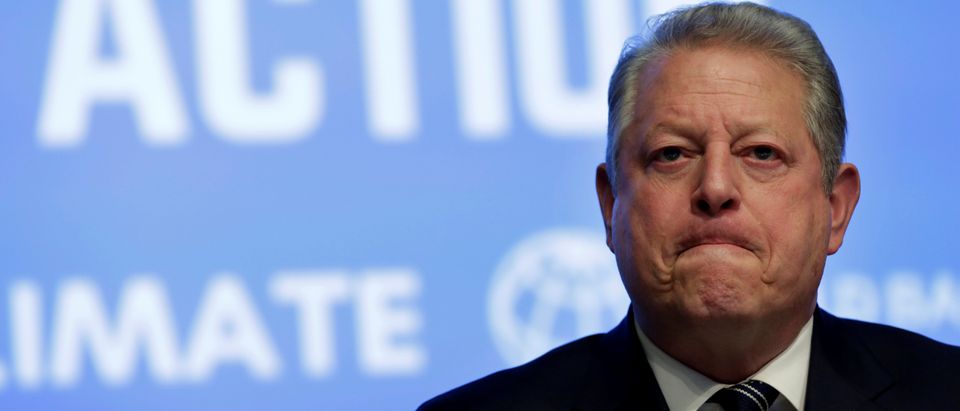Is this Associated Press article proof that global warming “is making us dumb” as one professor says in the wake of a news report that “Earth is noticeably hotter, the weather stormier and more extreme.”
University of Colorado professor Roger Pielke, Jr. called out a lengthy AP story claiming that global warming created “a different world” over the past 30 years — the time frame scientists typically use to account for natural climatic variations.
“We were warned,” is what the AP says about the supposed changes,”large and small,” that have happened in the last 30 years. The story is full of anecdotal evidence, official figures and alarming quotes from scientists.
“The statistics tracking climate change since 1988 are almost numbing,” the AP reported in its story. (RELATED: NY Times Admits It ‘Erroneously’ Reported Info About Scott Pruitt’s Daughter)
Pielke points to the article’s illogical claim that climate “change has been so sweeping that it is easy to lose sight of effects large and small,” focusing on the AP’s citing of hurricane damage data to insinuate that storms were becoming more intense.
The AP’s article makes several claims that are misleading. The Daily Caller News Foundation has listed the three most misleading claims made in the AP’s article on “numbing” global warming statistics.
1. Hurricanes
The AP’s story notes that “[t]he 14 costliest hurricanes in American history, adjusted for inflation, have hit since 1988, reflecting both growing coastal development and a span that included the most intense Atlantic storms on record.”
Pielke, however, took issue with AP’s use of hurricane damage statistics to imply storms had become more intense in the last 30 years. Pielke noted that hurricanes making landfall in the U.S. has changed little over time, meaning increased damages come from inflation and economic growth.
Want to know how hurricanes have changed in the US on climate timescales?
Look at climate data, not economic data. (Duh).
We did (graph from paper) https://t.co/LrS1Scrk6N
Anytime someone trots out economic damage as evidence of climate change we get a little dumber. END pic.twitter.com/2sJCpZTdaP— Roger Pielke Jr. (@RogerPielkeJr) June 18, 2018
Cato Institute atmospheric scientist Ryan Maue chimed in on Twitter, noting that globally, the number of Category 4 and higher storms have not increased since the late 1980s.
Good news over the past 30-years (1988-2017): the most “Intense” tropical cyclones (Category 4 and higher) globally have NOT become more frequent. The data and the numbers just don’t lie. pic.twitter.com/w6pXt9bvgl
— Ryan | weather.us (@RyanMaue) June 18, 2018
Likewise, a study by Pielke and Colorado State University hurricane expert Phil Klotzbach published in February found that “landfalling hurricane frequency or intensity shows no significant trend since 1900.”
2. Wildfires
The AP reports that “wildfires in the United States now consume more than twice the acreage they did 30 years ago.”
While this is true, the AP’s narrowing of its analysis to just the past 30 years leaves presents a misleading picture. Wildfires may be burning more acreage today than the 1980s, but that pales in comparison to the great fires of the early 20th Century.
The scale of U.S. wildfires has decreased dramatically since 1930, according to government estimates. That year, wildfires burned more than four times the amount of acreage burned in 2012.
In 1930, for example, wildfires consumed more than 50 million acres of land, but in 2012 wildfires only burnt up 9.2 million acres.
3. Record Heat
Again, the AP’s use of a 30-year timeline presents a skewed picture on heat records set across the U.S.
“[D]aily heat records have been broken more than 2.3 million times at weather stations across the nation, half a million times more than cold records were broken,” the AP reported, but a longer view of the century puts record heat in perspective.
“The Dust Bowl era of the 1930s remains the peak period for extreme heat,” reads the National Climate Assessment special report released in late 2017.
“In fact, all eastern regions experienced a net decrease, most notably the Midwest (about 2.2°F [1.2°C]) and the Southeast (roughly 1.5°F [0.8°C])” that are “mainly tied to the unprecedented summer heat of the 1930s Dust Bowl era,” according to the special report.
Follow Michael on Facebook and Twitter
All content created by the Daily Caller News Foundation, an independent and nonpartisan newswire service, is available without charge to any legitimate news publisher that can provide a large audience. All republished articles must include our logo, our reporter’s byline and their DCNF affiliation. For any questions about our guidelines or partnering with us, please contact licensing@dailycallernewsfoundation.org.


